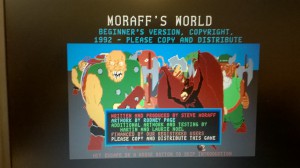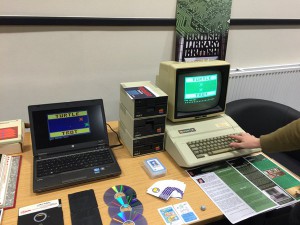Flashback is a proof of concept project run by the British Library’s Digital Preservation Team. The project is examining specific emulation and migration solutions as methods for preserving digital content held on CD, DVD , 3.5” and 5.25” disks. These mainly came to the British Library as supplements to print publications, most commonly with magazines and guide books. Below is a summary of Flashback’s progress and some of its initial findings.
In the summer of 2015 the Digital Preservation team began sourcing original hardware for our legacy lab (seen pictured below). The lab was set up to analyse an initial sample of 50 items from the Library’s collection, ranging from 5.25” Floppy Disks from the 1980’s to DVDs from the early 2000’s. The procurement of hardware was initially slow but once the word got out that we were looking, machines started arriving from sometimes unexpected sources. For organisations looking to locate similar hardware it is noteworthy that, once the lab was up and running, a surprising amount of colleagues walking past our door commented that they themselves had pieces of old hardware hidden away in garages and storage rooms that they simply never imagined would be of interest to anyone.

Once the lab was up and running it became clear that hardware from the 1980’s and 90’s have plenty of little quirks to contend with. The older pieces in the lab have good days and bad days, and can misbehave in new surprising ways! The exercise of setting up the lab shows how crucial projects such as Flashback are. Retaining functional legacy computers is already proving to be a challenge 20 to 30 years on – and the challenge will only increase with each passing year.
Instead of relying on old hardware for content access far into the future, the Flashback project extracts the content from its original storage media and implements a migration or emulation solution to deliver access on a modern PC.
“Capture” is a first step for each of the Flashback items. Described at a high level, the capture process used in the project extracts data from the storage media and characterizes its physical components (such as lists of files contained on the media); this enables us to place the content in a controlled environment. The capture process ensures that the bits are retained regardless of deteriorating storage media and also captures technical information about its content which is of importance for preservation planning. The practice does not however enable an average library user to access and make sense of the bits. The next step is exploring how captured files could potentially be delivered on modern hardware to library users.
Our solution for less complex content such as text is to migrate it from file formats associated with obsolete text editors to more contemporary and reliable formats. However, the large majority of the content in Flashback is so tightly bound up with its original environment that it cannot be migrated. This is especially the case for software, including items such as interactive computer games and music editing programmes. For this category we instead choose to emulate the item’s original hardware and software environment. Many of these environments were supplied to us remotely by the University of Freiburg via BwFLA – Emulation As A Service .


Flashback is creating a body of data about the performance and viability of emulating groups of software from particular technical ‘generations’. The Flashback lab shown earlier is key to creating this data. By comparing conceptual characteristics of the software on original hardware and emulators, including properties like behaviour and structure, we are able to monitor which content generations and content groups emulates consistently well and which is not of adequate standard. Flashback is looking to gather this data while functional legacy hardware is still available for comparison.
Flashback has provided many interesting results so far and we will share more information about the project as it progresses further and our data set grows. We are also very excited to have been invited to present the results of Flashback at the International Digital Curation Conference in February. For more information, see the IDCC’s website.

